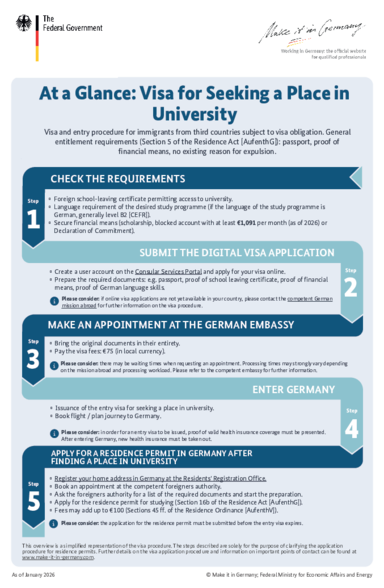
At a glance: Visa for studying
From the preparations to the application forms: This step-by-step guide shows you how to get a visa for studying.

With its wide range of study programmes and low tuition fees, Germany attracts many international students every year. Find out how to apply for a student visa here.
Are you interested in studying in Germany? A German degree opens many doors. There is a wide range of international study programmes and the fees are low. With this in mind, you can obtain a visa for the purpose of studying in Germany. A residence permit under Section 16b of the Residence Act (AufenthG) (External link) is also valid for preparatory measures prior to enrolment in higher education, such as language courses, preparatory courses for university admission or similar institutions, or doctoral studies at a German university.
To find out if you need a visa to enter Germany, please refer to the “Do I need a visa?” section.
Do you meet the above requirements? Then find out about how the entry and visa process works.
Residence permits for study purposes are usually issued for an initial period of two years. If you have not obtained your degree within this period, you can request to have your residence permit renewed for a further two years.
During your time at university, you can work up to 140 full days or 280 half days per year, or up to 20 hours per week. You can take part-time student jobs for an unlimited period.
After successfully completing your degree, you can extend your stay in Germany by applying for a residence permit for jobseekers under Section 20 (1) No. 1 of the Residence Act (AufenthG) (External link) . The residence permit is issued for up to 18 months as a means of finding skilled employment in Germany. You can work in any occupation while looking for skilled employment. As soon as you have found a qualified employment position, you can apply to convert your residence permit for study purposes into a residence permit for skilled workers or an EU Blue Card. You can find out more about the opportunities available to you while you study in Germany and after you graduate in the “Prospects after graduation” section.
Graduates of German higher education institutions can apply for a settlement permit (Section 18c (1) sentence 2 of the Residence Act (External link) [AufenthG]) after working in Germany for more than two years.
Do you have a student visa from another EU country and would like to study in Germany for a while? If your stay in Germany does not exceed 360 days, you do not need a residence title for Germany. However, the host educational institution in Germany must inform the Federal Office for Migration and Refugees (BAMF) and the competent authority in the other EU Member State about your intended study period in Germany. There are a number of documents that need to be submitted to the authorities when they are notified of your plans to study abroad.

From the preparations to the application forms: This step-by-step guide shows you how to get a visa for studying.
Have you decided to study in Germany but have not yet been admitted to a higher education institution? If you meet certain requirements, you may be entitled to enter Germany on a visa for seeking a place in higher education under Section 17 (2) of the Residence Act (AufenthG) (External link) .
To find out if you need a visa to enter Germany, please refer to the “Do I need a visa?” section.
Do you meet the above requirements? Then find out about how the entry and visa process works.
A visa or residence permit for the purpose of seeking a place in higher education allows you to stay in Germany for up to nine months. During this time, you can apply for a place at a university or for a preparatory measure prior to enrolment in higher education. Examples of preparatory measures include attending a language course or a preparatory course for university admission. A residence permit for seeking a place in higher education cannot be renewed for the same purpose.
During this time, you are permitted to work up to 20 hours a week. You also have the opportunity to complete up to two weeks of trial work. This means that you can earn some money during your stay for seeking a place in higher education.
Have you been admitted to a higher education institution in Germany or to a preparatory course for university admission? Then you can apply to your local foreigners authority (External link) for a residence permit for the purpose of studying under Section 16b of the Residence Act (AufenthG) (External link) .

From the preparations to the application forms: This step-by-step guide shows you how to obtain a visa for seeking a place in higher education.
Do you meet the necessary requirements? Then you can apply for your visa for studying or for seeking a place in higher education online here: Consular Services Portal of the Federal Foreign Office (External link) .
Let us advise you on your opportunities to work and live in Germany. Our experts will support you with questions regarding job search, visa, recognition and learning German.
You can find out more about the various contact options by clicking on one of the icons in the bar below.
Please switch to a modern browser (e.g. Google Chrome, Firefox or Microsoft Edge) in order to enjoy the best user experience.